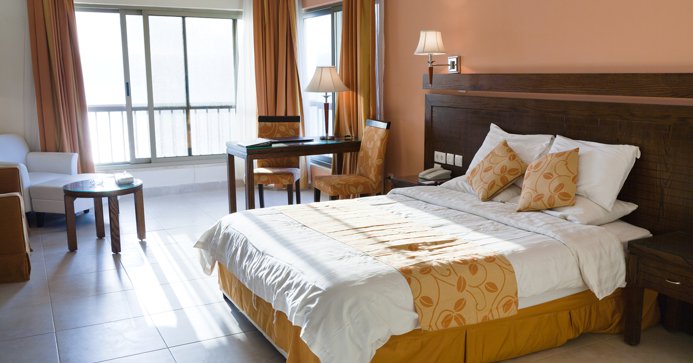Serviced apartments: a secure and simple German real estate investment

For travellers who want the convenience of hotel amenities and the comforts of a home away from home, serviced apartments offer the best of both worlds. Conveniently, the same can be said for investors seeking simplicity and security on the German real estate market.
Serviced apartments are furnished flats with kitchen areas and other amenities that allow a visitor to feel at home, as well as an array of hotel-style amenities, such as 24-hour reception and regular housekeeping services. Serviced apartments typically serve as temporary accommodation, with one to three months being a typical duration of stay.
Often, serviced apartments are managed by an operator who takes care of short-term rental logistics, and pays the owner receives an average of 3.5–4% per annum. Under German law, serviced apartments are designated as commercial property, which means the owner is not permitted to live in these properties but can rent them out on either a medium- or short-term basis. For context, major German cities tend to prohibit short- and medium-term rentals of residential flats.
Demand for serviced apartments is on the rise
Though serviced apartments have proven attractive to all types of tourists, business travellers account for the bulk of demand. Among their benefits is their cost effectiveness; in Berlin, for example, serviced apartments cost an average of 44 to 79 euros per night, while hotel rooms of comparable size and comfort (but without kitchen spaces) typically cost around 118 to 130 euros per night.
They are likewise more budget friendly than residential flats; unlike conventional flats, serviced apartments do not typically require substantial up-front deposits.
They also tend to be convenient for families and other large groups, who are able to save money by cooking-in during their travels, while also feeling more at home than they could in a hotel.
For these and other reasons, demand for serviced apartments is on the rise. According to The Global Serviced Apartments Industry Report 2020-2021, 43% of operators from around the world reported that occupancy duration and revenue per occupied room had increased compared to the previous year.
How to turn a profit from the serviced apartment trend
In cost terms, serviced apartments are comparable to residential flats: for example, the price of a 50 m² apartment in Berlin starts at 300,000 euros.
An investor wishing to add serviced apartments to their portfolio can opt either to buy individual apartments, or an entire building.
A lease agreement with an operator is usually entered into for 15–20 years with the option for renewal. Usually, the agreement provides for a fixed income for the owner, although there are also management agreements with a percentage of the proceeds, and hybrid variants. Leases are often structured as Double Net Leases, in which the operator bears most of the costs, including property tax and insurance. The owner pays for the maintenance of supporting structures, the roof, and capital utilities such as shared water and heating pipes.
The relatively high yield of serviced apartments compared to flats (around 3.5-4.0% p.a.) is attributable to the combined short- and medium-term rentals; short-term rentals are typically 1.5 times more expensive than medium-term ones, allowing for a variety of price points. This balance also ensures steady rental flows. Serviced apartments likewise draw higher rental fees than standard residential flats due to the presence of hotel-style amenities, such as round-the-clock receptionists.
Investors can also benefit from rising apartment costs; the square-metre price for Berlin new builds have soared by an average of 149 per cent over the past 10 years, with that rate standing at 22% for 2020 alone. Upon the expiration of the lease agreement with the operator, the apartments may be converted to residential flats.
Serviced apartments have proven relatively pandemic-proof
At the height of the pandemic, serviced apartments suffered less of a blow than the hotel sector as a whole, according to a 2021 Hospitality Insights report.
A key perk of serviced apartments for investors and developers is their relatively low break-even point of 20% occupancy.
Relatively low personnel costs are also a bonus; in serviced apartments, staffing costs constitute 12–15% of the total budget, on average, compared to 30% of budget costs for hotels. This makes serviced apartments more resilient in periods of decreased demand.
In the midst of the global lockdown, serviced apartments also found new sources of corporate demand: clients who comply with quarantine or self-isolation regimes, as well as those who switched to flexible work schemes.
According to Hospitality Insights, more than 20,000 units of serviced apartments are expected to open in Europe by 2025. The UK accounts for 29% of this new supply and Germany for 22%. More than 70% of investors surveyed by Hospitality Insights said they are actively seeking deals for new serviced apartment projects in key markets.
Tranio offers serviced apartments in Berlin with a guaranteed yield of 4% p.a. This above-market rate is due to the location of the project in an up-and-coming area, where selling prices are not yet very high, but rents are growing due to high demand.
We guide clients through the whole of the process, offering investment analyses, assistance with bank financing, legal and tax consultations, legal structuring assistance, and provide management services.
In 2021, we signed a deal for the construction of the three buildings of serviced apartments situated in Berlin’s district Köpenick. Nearby the complex, there are offices of scientific and technological companies such as Audi, Siemens, T-Systems, Lufthansa Aviation Traning. Famous Tesla’s Gigofactory that is about to open in Berlin is going to be just a 30-minute drive. Moreover, five kilometres away there is the Adlershof Technology Park, one of Europe’s most successful technology and media sites.
Adlershof is home to more than 1,000 international companies and research institutes, including the campuses of the Humboldt’s University of Berlin. Since the district is rapidly developing, Köpenick is expected to record a flood of workers and reserarches in the near future.
We will send you a content digest not more than once a week
